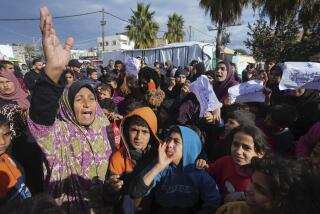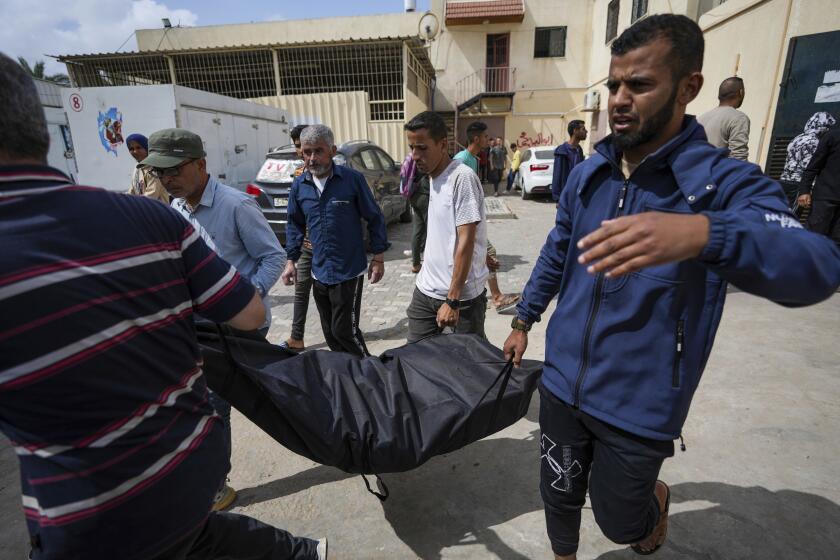Iran fetes new foreign minister ahead of nuclear talks
Tehran and Washington are seeking to expand their regional influence ahead of another round of talks over Iran’s nuclear program, which has become a source of widespread international concern.
On Saturday, Iran feted its newly designated caretaker foreign minister, Ali Akbar Salehi, with a reception in Tehran. Salehi announced that he would seek to strengthen ties with Turkey and Saudi Arabia, a Sunni Arab-led power that has bristled at Shiite Iran’s growing influence in the Middle East.
Meanwhile in Bahrain, Adm. Michael G. Mullen, chairman of the U.S. Joint Chiefs of Staff, met with the island nation’s king Friday night and sought to rally friendly Arabian Peninsula nations to the cause of curbing Iran’s nuclear program.
“A regional approach is very powerful in deterring a country like Iran,” Mullen said, according to the Pentagon website. “That kind of regional approach … is needed. None of us can do this alone. We need partners now and in the future.”
Mullen added, “From my perspective, I see Iran continuing down the path to developing nuclear weapons, and achieving that goal would be very destabilizing to the region.”
Salehi, a diplomat and scientist who most recently served as the head of Iran’s nuclear program, replaced longtime Foreign Minister Manouchehr Mottaki, who was dismissed abruptly while on a trip to Senegal. Mottaki didn’t attend Saturday’s event even though official media described it as a ceremony to bid him farewell.
By virtue of his English- and Arabic-language skills, cosmopolitan polish and close ties to Iranian President Mahmoud Ahmadinejad and supreme leader Ayatollah Ali Khamenei, Salehi seems poised to become a significant player in Iran’s international affairs.
He appears to have been granted a broader mandate than his predecessor to set policy, and went about defining objectives Saturday that included focusing attention on neighboring countries and Muslim nations; maintaining a “special place” for relations with China and Russia; and remaining receptive to European Union nations hungry for Middle East oil and gas.
“The speedy transformation of the policy of confrontation to cooperation by the EU would be in the interests of both sides,” he said.
But Salehi emphasized relations with Saudi Arabia and Turkey, describing them “as the two countries that hold the most significant position” in Tehran’s worldview.
“Iran and Saudi Arabia are two influential countries of the region and the world of Islam, and cooperating together, they can solve problems of the region and the world of Islam,” he was quoted as saying, noting Saudi Arabia’s roles as a pillar of the world economy and host to two of Islam’s holiest sites.
Salehi said Iran and Turkey share cultural and ideological ties that make them natural partners. “Turkey is a powerful country with zealous people and a strategic status, and the expansion of relations with that country would be in the interests of the world of Islam,” he said.
He did not mention any modification or restating of Iran’s position regarding the United States, which has accused Tehran of pursuing nuclear weapons. Iran insists it only is expanding its nuclear infrastructure for civilian purposes.
Ahmadinejad, in a live television interview Saturday night during which he announced the ending of fuel subsidies nationwide beginning Sunday, praised the most recent international nuclear talks in Geneva. He expressed optimism that talks would continue after next month’s planned discussions in Istanbul, Turkey, and suggested that the next round could be held in Brazil, which like Turkey voted against imposing sanctions on Iran at the U.N. Security Council.
“I believe the talks held in Geneva were very good. Iran’s representative spoke the right words,” he said. “I hope in talks in Istanbul, then in Brazil and then Tehran, we could reach a framework of cooperation. This is to everyone’s benefit.”
Mullen, following his meeting with Bahraini King Hamad bin Isa Khalifa, said military strikes on Iran’s nuclear facilities would be “destabilizing” and called for dialogue with Tehran, but added, “All options have been on the table and remain on the table.”
More to Read
Start your day right
Sign up for Essential California for news, features and recommendations from the L.A. Times and beyond in your inbox six days a week.
You may occasionally receive promotional content from the Los Angeles Times.






